Menu
|
Souad Massi is "the internationally most successful singer-songwriter of the Arab speaking world". Sandra Arslanian, herself a well respected musician from Beirut , Lebanon ("Sandmoon"), talked with Souad before a recent concert in Antwerp, Belgium It was a stormy Belgian Sunday evening in February, and yet, despite the rough winds and icy rain, the gorgeous concert hall De Roma was full and eagerly waiting for the Algerian-French diva to warm its heart. There she was, as simple and brilliant as ever, graciously holding her guitar, sitting in the middle of a half concave circle – violin and oud to the left, western and eastern rhythm sections to the right. As the tripping sounds of the orient subtly married the pop-folky hooks of the west, carrying her gentle voice to higher spheres of consciousness, Souad Massi unmistakably warmed our hearts and lifted our spirits. Her musicians masterfully followed the inclinations of her pulse, and periodically broke into virtuoso solos. Soon we were all clapping and jiggling on our seats. Belgians and Middle-Easterns alike. We were all one, blending with the music. I even dropped a few trembling tears as she sang “Pays natal” (“Homeland”), unornamented, genuine. “ll n’y avait rien à regretter là-bas…Pourtant j’y pense encore, j’ai un peu mal” (“There was nothing to regret there…However, it hurts a little when I think about it again”). And when I turned my face to look at the Moroccan girl sitting next to me, I noticed that she too was looking for a handkerchief to timidly wipe away the melancholy. I smilingly whispered to her “Matebkiche” (“Don’t cry”), the title of one of Souad Massi’s earlier songs. Folk ballads and more upbeat chaabi, oriental tunes flowed in turn filling the space with sights and sounds of a jasmine scented world of longing and love, owing Souad a much-deserved double standing ovation. Before the show, I had the opportunity to meet with Souad backstage. The interview was a bit delayed due to last minute sound check fine-tunings. Despite time constraints, the encounter was laid-back and we shared some colorful thoughts about womanhood, revolution and life. Here is a freehand transcript of our conversation, complemented with some ad hoc comments. Sandra Arslanian: I know we are a bit late and I know how it feels right before a gig, so this won’t take long. On the other hand, I’m sure that after 30 years of career, you are used to pre-stage stress… Souad Massi: Well, even after all those years, you still feel nervous! (smiles) Beirut - Algiers. We’re in the same kind of socio-political situation, aren’t we? The peaceful protests, the mobilization, the awareness, the youth on the streets demanding a better political system, fighting corruption … It’s true, there is a link between Algiers and Beirut. We are fighting against corruption. But you have other problems as well that we don’t have in Algeria, like multi-confessionalism. However, I must say that I don’t feel this multi-confessional issue when I’m in Beirut. I have friends there of all religions and cultures: Muslims, Christians… I don’t feel the tension. Most of my friends are artists. Art is beyond religion, thankfully. You launched your tour in Beirut… The first gig of my album release, “Oumniya” (“My wish”) was in Lebanon early October 2019, yes. I thought “why not do it in Beirut?”. And then the revolution started on October 17th, a few days after the gig. So you’re the one who organized it… (laughter) I brought it with me from Algeria. But I didn’t do it on purpose. (giggles) Can we call you a socially-committed singer? Among other things, Souad organized a concert in support of the Algerian Hirak in Paris last Spring. I try to be. It’s not easy. But I believe it is important for an artist to have a message to convey. An artist has to awaken people’s consciousness, raise awareness, make things move. It is the role of the painter, the poet, the writer, as well as the intellectual and the journalist. it’s an important role. Stirring people’s consciences… Yes. You are mostly concerned by Human Rights and Women’s Rights. Well, not just by Human Rights and Women’s Rights. I also try to talk about Nature, to defend the environment. Danger is right around the corner. You are thinking about your kids… Souad has 2 daughters, 14 and 8 years old Yes, we have to prepare them to defend themselves. The environmental crisis is acute. Experiencing the revolution from afar, does it hurt? Souad left Algeria in 1999, at the age of 27 when she was invited to perform at the Femmes d'Algerie ("Women of Algeria") festival in Paris. She has been living in France ever since. I am following the events in Algeria on a day to day basis. I try to be present, even from afar by participating in demonstrations in Paris. We don’t have any other choice really. We have to storm the streets, say what we have to say, brandish posters and slogans, sing songs to raise awareness. People need to understand what is going on. There was a beautiful protest today in Paris, but unfortunately, I couldn’t be there since I’m here. You can actually mix pictures of the revolution in Beirut and Algiers, they are so much alike: the youth, the slogans, the posters, the artists, the colors… and the women! Yes, the women! “Once women take to the streets, then you can call it a revolution”. I don’t know who said it, but I totally agree.* It’s great to see women in the Arab world take on this role. Especially in the Arab world! I’m so happy to see the image of the Arab woman change, steering away from the sexy, doll-like figure to the woman wearing jeans, no make-up and defending ideas. It makes me feel proud. *The actual quote is by Lila Benlamri, an Algerian activist who said “When men take to the streets, it is a revolt; when women take to the streets, it is a revolution” Do you think that this flawed image of women is also present in Beirut? It is especially true in Beirut, yes. Beauty is a cult in Lebanon. You worship the body, the physical beauty. Just look around you, on TV, the billboards, it’s everywhere. It is not the case in Algeria. We’re far from the “beauty cult”. Particularly right now, Algerian women are voicing their opinion, they’re present in public spaces, making demands, making their voices heard. There are a lot of strong women in Lebanon as well… Yes, of course. No doubt about that. There is a stigma attached to female artists in the Arab world. And you suffered from it? I read somewhere that in your early twenties in Algeria, you cut your hair and dressed up as a man to be able to continue performing… No, no… I didn’t have to cut my hair for that reason at all. I cut my hair because I wanted to, not because I was compelled to. I was a real tom boy at the time. Nevertheless, it is true that the Algerian society didn’t easily acknowledge or accept differences in opinion or thought. Individual liberties were not respected. We grew up with religious and social constraints, stiff ideas. Women were made to get married and have children. Being an artist – whether an actress, dancer or musician, was not well viewed at all. Thankfully, my parents were more open-minded. However, things are moving in the right direction now, though there is still a lot of work to be done. "Music can make me cry. A single word can touch me." Can we call you a spokesperson-singer? You become a spokesperson in spite of yourself. People project and recognize themselves in you. I’m not bothered to be taken as a point of reference. Such is the role of certain artists. “Spokesperson” in French is “porte-parole”, literally “carrying-words”. Words are important for you. Of course, words are important. For any sensible person, they are! Words carry weight, especially at a certain age. You can say stupid things when you’re 14 or 15, but not at 30, 40 or 50 particularly when you are an artist and you convey ideas. You have to weigh your words carefully. Word over music? Both are important for me. Music can make me cry. A single word can touch me. I attended a poetry reading in Paris recently. I was excited like a little girl, mesmerized by emotion. You don’t like the expression “singer in exile”? I don’t like it because I don’t consider myself as such. My grandfather was in exile, yes. He came to work in France, in difficult conditions, spent years without seeing his wife or his children. This hasn’t been my case at all. I am free, I can travel whenever I want. It is out of respect for those who really suffer from exile, that I refuse this expression. However, had you stayed in Algeria, maybe you would have been less melancholic in your songs? It’s my character to be melancholic. With everything that is happening in the world, it is easy to sound sad. You sing « Pour les voisins d’à côté je ne suis pas une immigrée » (“For the next door neighbors, I am not an immigrant”) in your song « Pays natal » off your latest album “Oumniya”. It’s not my text. It’s by Françoise Mallet-Joris*, a Prix Goncourt recipient. I chose this text because I recognized myself in it. *Who happens to be born in Antwerp, the city where Souad Massi was performing that night. Do you feel a difference when singing your own words vs. words written by others? Souad usually writes in Algerian Arabic or Kabyle. But she sings in Algerian Arabic, Kabyle, French and classical Arabic. Her previous album “El Mutakallimun” (“Master of Words”) was an ode to Arabic, or rather Arabo-Andalusian poetry. I feel a certain pressure when singing words written by others because I want to make justice to the text they wrote. However, I won’t sing it if I don’t recognize myself in it. It definitely has to “sound” like me. Do you write in French? I have given it a try, but I did not pursue it. It didn’t feel natural, and I wasn’t happy with it. There are such good French writers, I let them write in French. Do you consider yourself an Arabic singer? In Algeria, the Kabyle are Kabyle, the Algerians are Algerians… It sounds awkward to me to be called an Arabic singer, because I come from the North of Africa. Why associate myself to the Arab identity per se? I speak Arabic, true. But I am Berber. I am North African. I’d like to be seen as such. So, an Algerian singer? Yes, rather. (smile) A cultural ambassador of Algeria… It’s a beautiful expression. I like it. (big smile) Is there a future for Arab, North African artists if they stay local? It depends. Some can succeed. But socially committed artists won’t be able to succeed in their country due to constraints. Like you… Yes, like me (laughter) Arab News wrote about you: “Internationally most successful singer-songwriter of the Arab-speaking world”. It’s a dream path for all artists of the Arab world, I guess. Souad got signed to a major label immediately after her first performance in France in 1999. She has released 6 albums since, including a string of hit songs (Raoui, Ghir Enta, Le bien et le mal, Houria…) and has toured the world. She won the “Victoire de la Musique” in 2006 and the “Grand prix des musiques du monde” in 2011, and has had the chance to sing duos with such artists as Manu Chao, Cesaria Evora, Francis Cabrel, Florent Pagny… It all happened in a very spontaneous manner. I never really took a step back to think about how it all came to be. I’m still on this path and I don’t ask myself any questions. I guess it’s my life path. I let myself follow the flow. I need time to think about it actually… It’s been 20 years… I know, but I still didn’t take the time to analyze it. You are an inspiration for young artists… Yes, I realize that. When I go to Egypt for instance and I meet young bands who play Rock music… It makes me happy. And I think “oops, now I’ve gotten old”. You yourself have played some heavy Rock when you were young… I was in a Hard Rock group called Atakor… It’s difficult to believe… Well, I didn’t sing any Hard Rock, I only played the guitar. (laughter) . It was at an age when I needed to let out that kind of energy. There were a lot of taboos in Algeria at the time, and playing this kind of music was like braving the taboos. It gave us a kick. You once said “I share my privacy, I lay myself bare” It’s not easy for us singer-songwriters, because we tell the story of our lives. I had a hard time doing this, particularly in the beginning, telling things that are very personal to people I don’t know. With time, I understood and accepted it. I would have had to change jobs had I not*. * She did venture briefly into urbanism/architecture after completing urbanism studies, but dropped it to pursue her career in music. Do you prefer intimate gigs or stadium concerts? I prefer small gigs, in small club venues. I also like beautiful concert halls like the one we’re playing at tonight (De Roma). I already sang in a stadium in Egypt, as part of a festival with other bands. It’s a different experience. You need to adapt yourself. What about being accompanied by a philharmonic orchestra… That’s a different exercise altogether. I’m familiar with classical music because of my formative years playing classical music, like Chopin… Anyways, it’s great: you are in the middle of 40 musicians, in the midst of this “sound”. It’s very emotional. The first time, I was dead scared. But it’s truly magnificent. I don’t know if you’ve had the experience… I’d love to… If it happens one day, you’ll have to make the most of it and really enjoy it. It’s very impressive. “For me, the most important thing is to stay true to myself” You are a genuine singer, you don’t lie… No, I don’t. You also said “I don’t care to make commercial music, I want to do what I love” I don’t make commercial music. If I did, I would have been ultra rich. (laughter) You are a Mother-singer. Your daughter sang with you on “Je veux apprendre” (“I want to learn”) off your album “Oumniya” Yes, I sang with my daughter because when I was recording that song at the studio in Algiers, she was there. My brother who was also there said that it would make sense if she sang on it since the song is about the emancipation of young girls. So we rehearsed the chorus, and recorded her singing it. I loved it. We immortalized the moment. And with this interview, albeit on a different level, we immortalized our conversation. Thank you Souad. Sandra Arslanian is the leader of Beirut's indie pop/rock band Sandmoon. Sandmoon's latest track and video is "Angels". A next Sandmoon album will be released soon.
0 Comments
Photos by May Arida 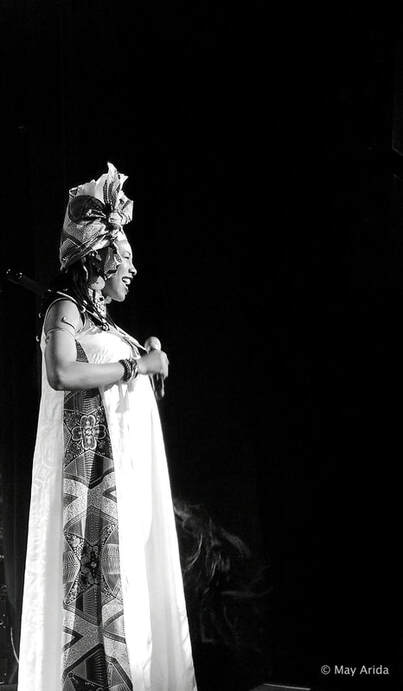 At the end of the film "Sia - the dream of the Python”, Sia confronts the new king, undresses herself and storms bare-chested out of the palace. She then time travels and in the next scene you see Sia walking in the streets of Ouagadougou where she demonstrates against tyranny all by herself. The main part in Sia is played by Fatoumata Diawara. It is a fictional story, but the persona in the film also carries quite a lot of Fatoumata Diawara character traits: fierce, unapologetic and authentic. As a child and as a teenager Fatoumata didn’t have an easy life. Growing up in difficult family circumstances, first in Ivory Coast and then in Mali, she had to fight to survive, against the tyranny of a family and a traditional society that had earmarked her for a different role in life. At the age of twenty Fatoumata Diawara ran away from home and joined a French theater troupe. "If I had that slip by," Fatoumata once said in an interview, "I wouldn’t be here today. I’d have minimum nine children and be very, very old (Fatoumata is 37 years old). My breasts would already be sagging and I wouldn’t have a job because I don’t have diplomas.” Tonight Fatoumata Diawara takes the stage of the Kaufleuten in Zurich. In the meantime she is no longer just an actress, but has also become a musician; she writes her own songs, plays the electric guitar and tours the world non-stop. It is a sunny Sunday evening in Zurich, you could also take a walk by the lakeside or have a barbecue in the garden, but the Kaufleuten concert venue is full. It is a mixed crowd that is waiting for Fatoumata, multi gender, multi age and multi ethno. Do they know what is in store for them? Can the audience anticipate that it is about to experience the greatest show that one can imagine as a concertgoer, with a personality - a woman, an artist - whose energy and presence on stage are second to none? Fatoumata Diawara doesn’t need to sing love songs because she herself is love. And then Fatoumata Diawara enters the stage. She is tall, she is beautiful, she starts to sing and to play, from Mali, from Africa, actually from all of us. For we are one planet, one humanity, one heartbeat, says Fatoumata, and the collective love that we derive from it makes it happen that by the third song already everybody in the house claps, dances and feels happy. Words are important to Fatoumata Diawara, however only very few in the public understand the lyrics of her songs word for word. Fatoumata sings in Bambara, a language from Mali. But she speaks with the eyes, with her voice; she talks with her gestures and with her body, and everyone knows what she means. Fatoumata Diawara wails, she jubilates, she accelerates and then slows down the pace again. It’s like a ride on the roller coaster of life where at the end the comfort of human warmth and the laughter of love await. I had hoped to interview Fatoumata Diawara before her concert in Zurich but her management shielded her from any requests because she needed to rest and to refuel before her "never ending world tour" continues. Experiencing her performance this evening, I understand why. Fatoumata goes all in when she's on stage. She has just been exhaustively touring in the USA, Canada and Spain, and after Zurich she will play in France and at the big festivals in Glastonbury and Montreux.
I would have wanted to know from Fatoumata Diawara how she, who speaks a lot about her responsibility towards Africa and the Africans, can handle this responsibility. Is it not too much for her at times and too heavy a load? It seems like she wants to save all of Africa on her own and counteract the rampant afro-pessimism (the Africans are muddling through and it's never getting any better) with a robust self-confidence that advocates specific African values and a self-responsible attitude to shape the continent. "Let's talk about the new Africa," says Fatoumata, the spokeswoman for a better Africa, in Zurich. "Many positive things happen with the new generation.” I also wanted to ask Fatoumata Diawara how she reconciles her two vocations, activist and artist. Can one say that her music embodies the artist Fatoumata and the lyrics her activism? How does she manage to find the right dose for both the fun and the serious? Incidentally, this dual role is not unknown in the culture of Mali. Already the early hunters - activists, if you will - became artists after a successful hunt and picked up an instrument to sing their own praises.  Self-evidently Fatoumata Diawara doesn’t sing her own praises. She doesn’t have to and she is way too smart for that. The rifle of yesterday's hunters has become Fatoumata's guitar of today. Just like her idol Fela Kuti, the Nigerian musical activist who invented the Afrobeat, a mixture of American funk and traditional African rhythms, often paired with provocative lyrics critical of the ones in power. In her repertoire Fatoumata Diawara has a song Fela-Kuti-style as well. When she performs “Negue Negue” (let’s have fun) from her current album “Fenfo”, Zurich goes through the roof. There is no more holding back; Fatoumata is grooving, the bass is booming, the audience is going wild. “We are having fun,” she sings, “it is what makes this world a better place to live in.” Fatoumata was not programmed for fun when she was born. Consequently she began her career as a musician writing and singing protest songs. "That's what I can do," she said in an interview for Afropop worldwide. "I can’t sing love. I can’t sing lightly." Fatoumata Diawara doesn’t need to sing love songs because she herself is love. She is love for the music, love for the people and the light on her face radiates and warms and brightens up even the last spectator in the darkest corner at the rear end of Kaufleuten. I am your sister and you are my sisters and brothers, says Fatoumata. We all want to hug ourselves and Fatoumata first and most strongly. Fatoumata is fantastic, Africa is fantastic, music is fantastic, we are one life and one love. We are one with Fatoumata Diawara. |
EditorKurt is based in Bern and Beirut is his second home. Always looking for that special angle, he digs deep into people, their stories and creations, with a sweet spot for music. Archives
September 2020
Categories
All
I'd love to discover you. Share your creations here.
|

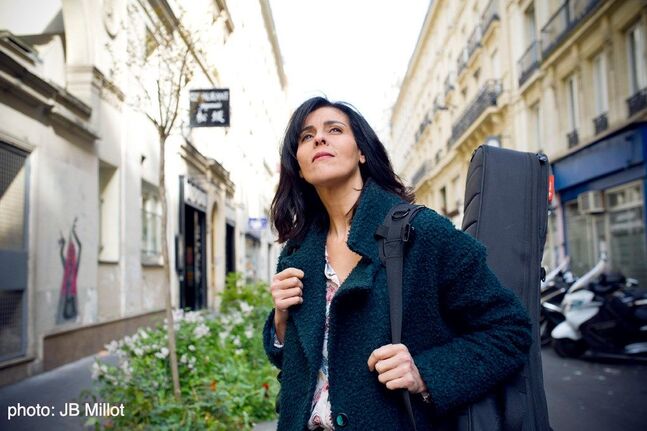
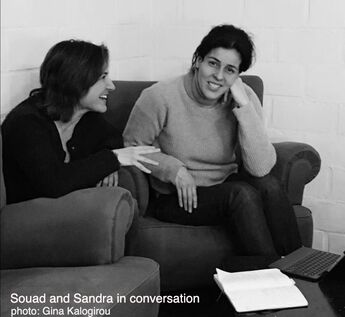
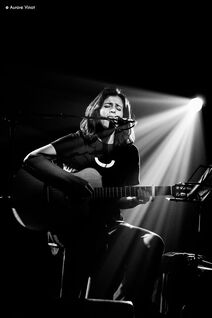
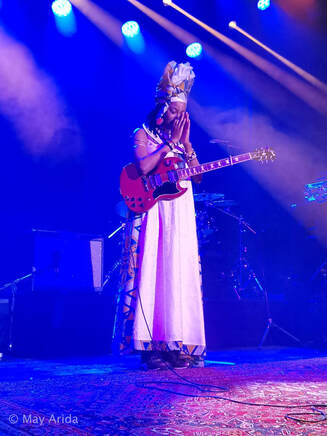
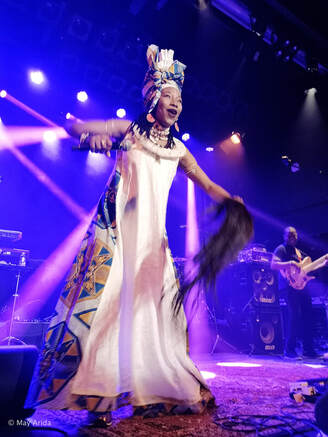
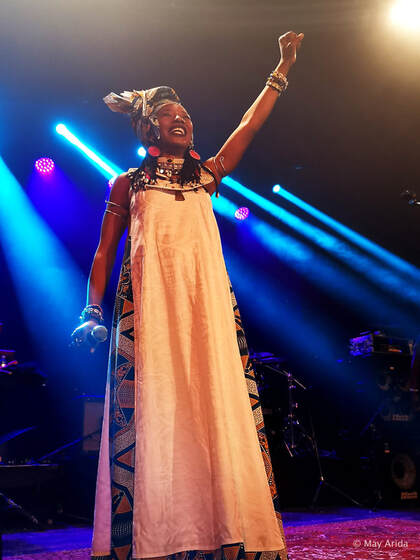
 RSS Feed
RSS Feed
